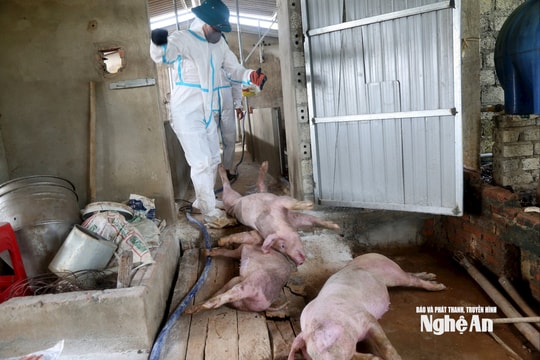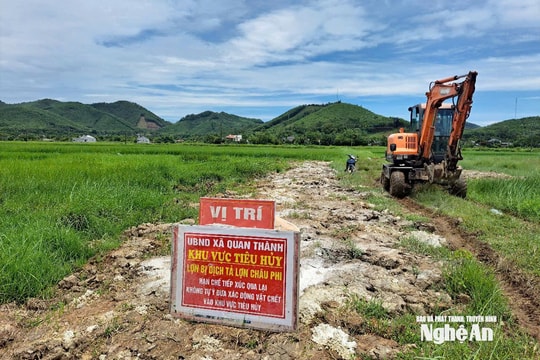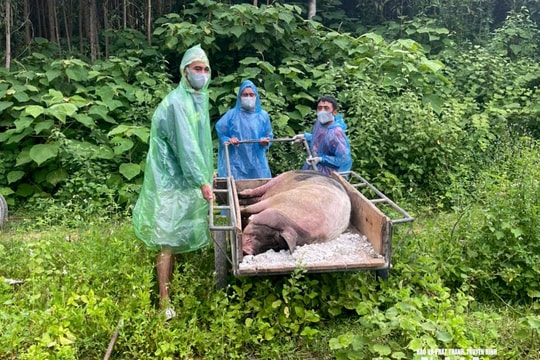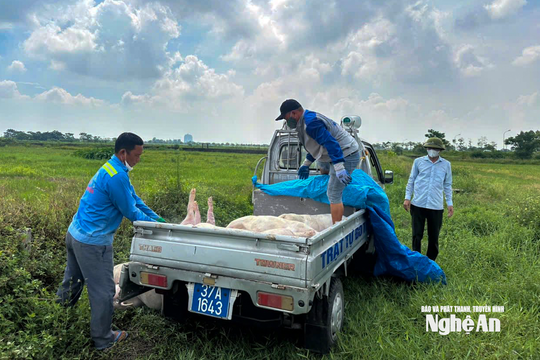Nghe An: Livestock diseases increase due to lack of commune-level veterinarians
(Baonghean.vn) - According to Resolution No. 22/2019 of the Provincial People's Council, from January 2020, the title of veterinary officer is no longer included in the list of non-professional commune-level paid positions. After nearly a year of implementation, this regulation has gradually revealed many shortcomings.
Difficult livestock farming households
Standing in front of the empty shed that used to be a buffalo barn, Mrs. Ca Thi Lich in Vuc village - Chau Ly commune, Quy Hop district could not hold back her tears. In just 4 days, 11 healthy buffaloes suddenly died. "We have raised them for more than 8 years, they paid 18 - 20 million VND/buffalo, but they stopped eating, had high fever, vomited blood and died very quickly. I asked the veterinary service in the commune to give them injections but it did not help, they also did not know what caused the buffalo to die." With no buffaloes left, she and her husband also put aside their dream of renovating their dilapidated stilt house. "Luckily someone came to buy them, and they sold each one for 1 million VND" - Mrs. Lich cried.
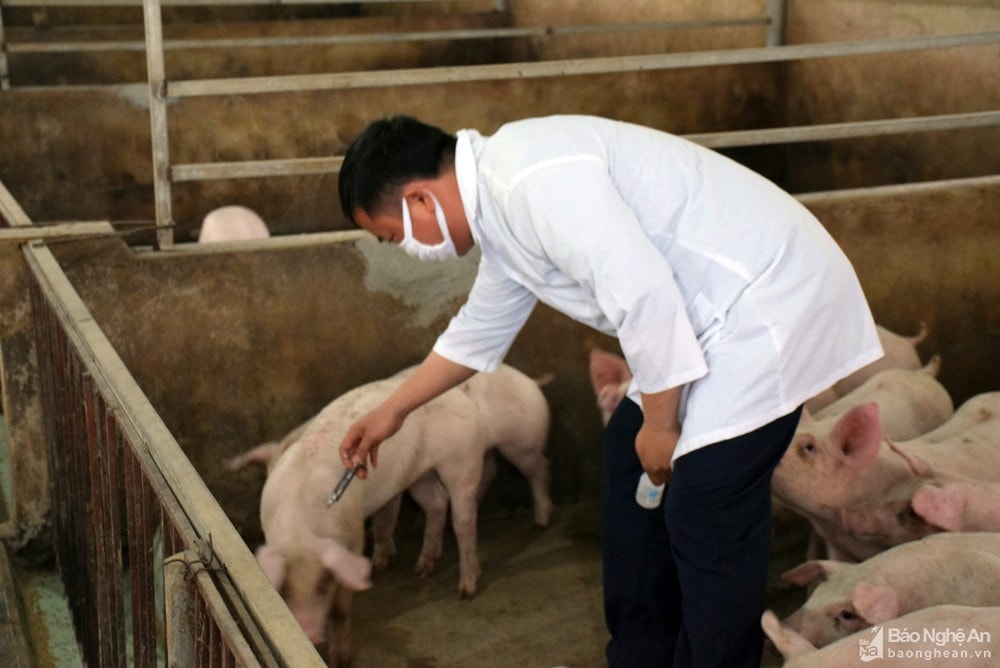 |
| During the vaccination campaign for livestock this spring, many localities had to hire veterinary staff. Photo: Xuan Hoang |
After the buffaloes died of anthrax, the villagers sold them outside, then the commune got the information and stopped them, destroying 8 buffaloes. The traders took the rest out of the area, easily becoming a source of spreading the disease.
Mr. Tuan said, the most difficult thing in animal husbandry today is not havingveterinary staff. This field in Chau Ly commune is being assigned to Ms. Nguyen Thi Lam - a land and agriculture official of the commune. "I do not have veterinary expertise, so disease monitoring and clinical diagnosis are very difficult and limited, often requiring support from district-level professional agencies. This is time-consuming, difficult to control the epidemic in a small area, easily causing the epidemic to spread quickly, and the risk to livestock farmers is very high" - Ms. Lam confided.
Not only in mountainous, remote and isolated areas, but also in midland and delta communes, care, prevention and monitoringanimal diseasesnot much better.
When the birth date was just a few days away, the sow of Mrs. Nguyen Thi Thanh's family in Hamlet 6, Thai Son Commune, Do Luong fell ill. "Seeing that the pig was eating less, I called a service provider to give it a shot, but after 3 days of injection, the pig still did not get better, and 2 days later, the pig died." Only when she heard the announcement on the loudspeaker did Mrs. Thanh know that her pig died from African swine fever. "Only when the pig died did she run to call the commune, but when the veterinary staff heard that they had already disbanded, if she got sick, she would not know who to call," said Mrs. Thanh.
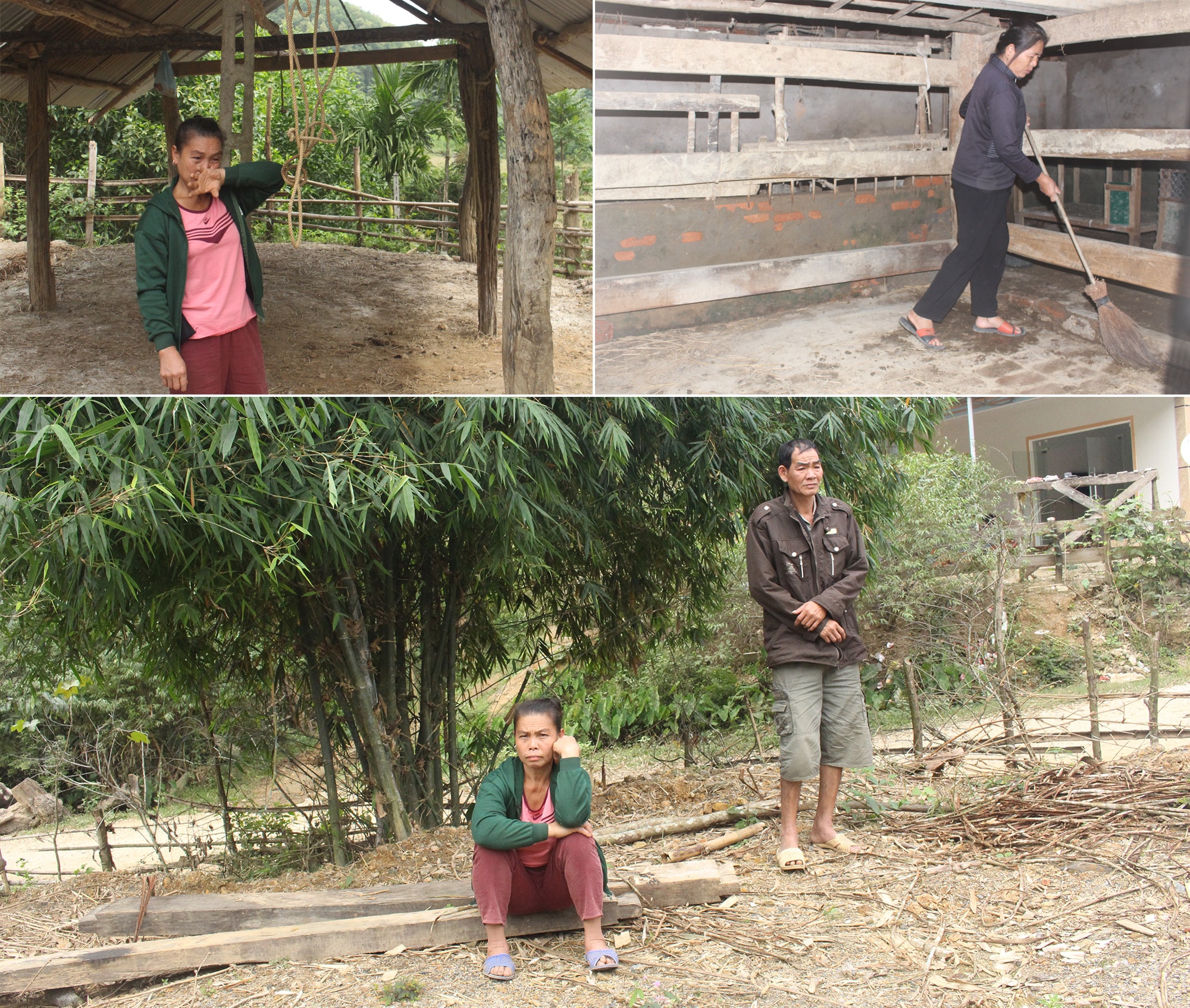 |
| Many households were left empty-handed when their pets died of disease. Photo: Phu Huong |
The government is confused.
Not only are livestock farmers worried, but even the commune authorities are confused and passive. Entering mid-November, in Do Luong district, only a few communes such as Tru Son, Dai Son, Minh Son... have implemented vaccination for the autumn crop.
According to Mr. Vo Dinh Khoa - District Agricultural Service Center, besides objective reasons such as epidemics and floods, the most difficult thing is that the grassroots veterinary network no longer exists. Vaccination progress is slow, monitoring,disease treatmentIn a narrow area, it becomes difficult while district staff cannot meet the demand because there are many communes and a large area.
“In many cases, when we receive the news, the epidemic has spread to other households and even other hamlets, making it very difficult to contain and control the epidemic at the household level like before,” Mr. Khoa worried.
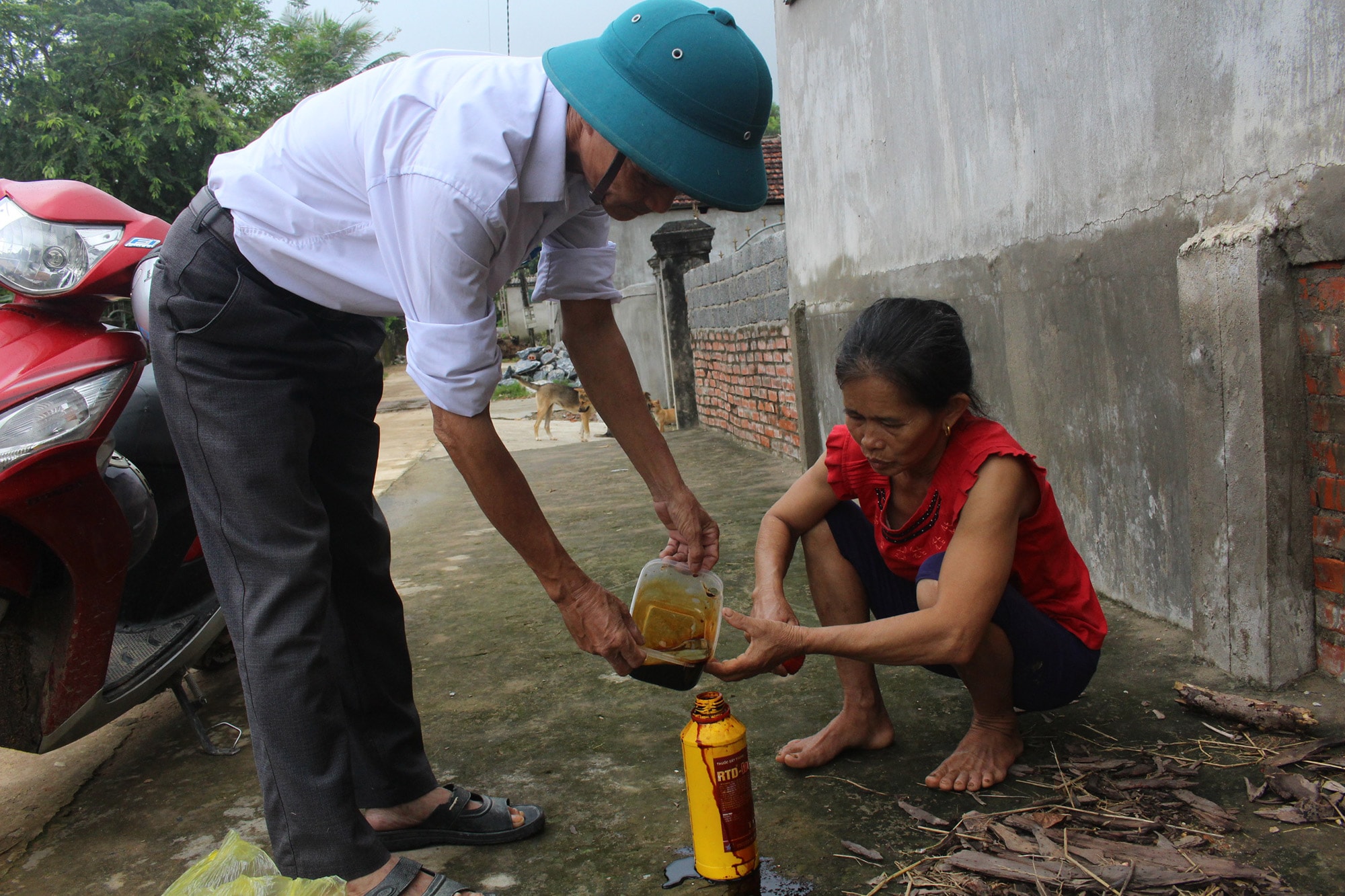 |
| Providing disinfectant chemicals to people in Xuan Son commune, Do Luong. Photo: Phu Huong |
“We have to take care of our own budget, the rental price is set by the person hired, sometimes 2-3 times higher and they are not as responsible as when they were veterinary officers. Currently, it is the time for regular vaccination and the epidemic is re-emerging, the commune must mobilize all the commune People's Committee staff to directly supervise the vaccination work, and to be able to immediately report to the higher authorities when there are sick animals.”
With an income of nearly 40,000 billion VND/year, the livestock sector currently accounts for 48% of the agricultural sector, including the important contribution of household livestock farming, which accounts for 80% of the province's total herd.
The abolition of the position of non-professional veterinary officer at the commune level - after nearly a year of implementation - has revealed many shortcomings, especially for a purely agricultural and livestock-developed province like Nghe An.
Previously, the whole province had 460 commune-level veterinary officers, but from January 1, 2020, wards, communes, and towns were forced to assign agricultural officers, land officials, farmers' associations, even youth unions, militias, and the Fatherland Front to take on additional veterinary work, while most of them did not have expertise in this field.
According to statistics, in this year's spring vaccination campaign, more than 270 communes in the province were unable to organize vaccinations. The implementation of the second round of supplementary vaccinations also encountered many difficulties. According to Mr. Ngo Duc Quynh - Deputy Head of the Department of Animal Husbandry and Veterinary Medicine, in addition to the Covid-19 epidemic, there was also a lack of human resources.
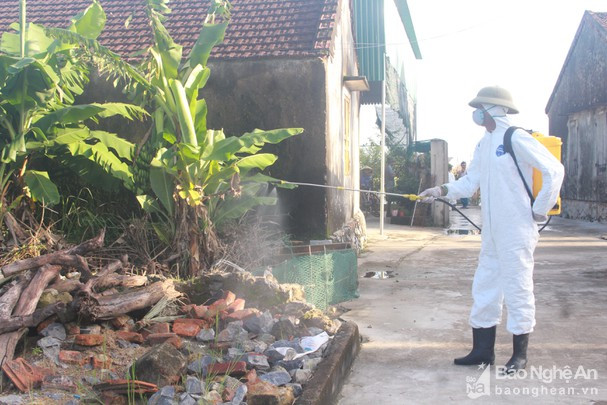 |
| Spraying disinfectant to prevent epidemic in Dien Chau. Photo: Phu Huong |
Review and amend to suit reality
Commune veterinary officers are the advisory force for local authorities in disease prevention and control, and livestock protection. In vaccination, they are both the deployment force and the direct vaccination force for livestock and poultry; when an epidemic occurs, they are the first to be responsible for clinical diagnosis, treatment, and coordination in zoning and epidemic suppression.
Without this title anymore, communes have to find ways to overcome it but it is still difficult to meet the requirements. "We assign district-level veterinary officers to directly command by region, however, the thin force cannot meet the demand. Currently, African swine fever, FMD, and Anthrax have recurred, the district is directing to overcome it by hiring people to prevent the epidemic; assigning agricultural officers to monitor, synthesize, and advise on handling" - Mr. Nguyen Trung Thanh - Vice Chairman of Do Luong District People's Committee said.
According to Mr. Nguyen Duy Hung - Head of the Department of Agriculture and Rural Development of Quy Hop district, most of the part-time staff do not have expertise; service providers are not assigned specific responsibilities, so it is easy to affect the quality and progress of epidemic prevention.
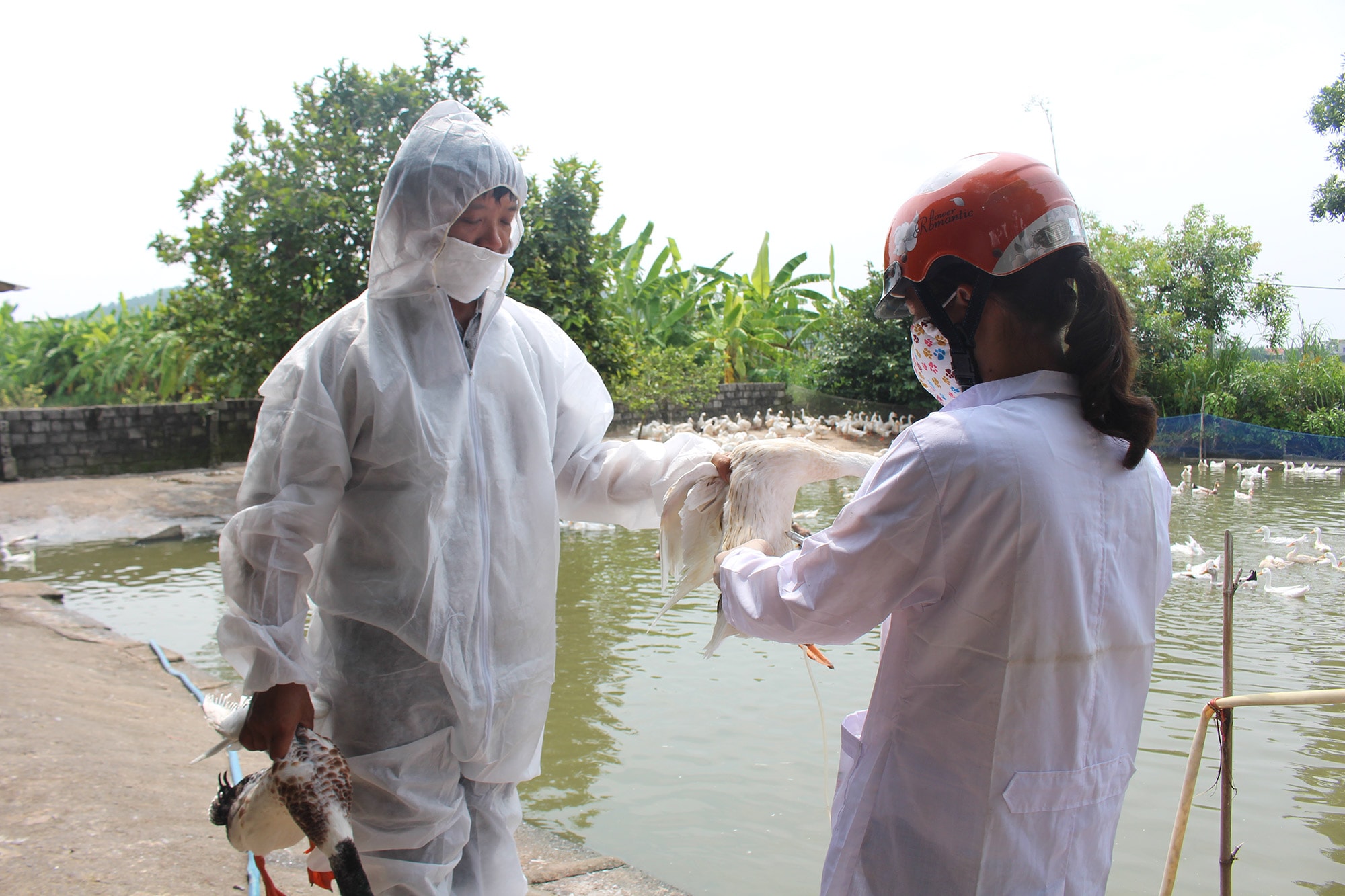 |
| Nghe An livestock farming is being affected by many types of diseases. Photo: Quang An |
At the end of 2019, the People's Council of Nghe An province drafted Resolution No. 22/2019 based on Decree 34/2019 of the Prime Minister, which included the abolition of the non-professional veterinary position. In reality, many problems have occurred, especially in localities with large livestock herds, where vaccination is very difficult and there are many difficulties in disease prevention.
“The streamlining of the apparatus and effective and efficient operation in accordance with the spirit of the 12th Central Resolution 6 is a major policy of the Party. In the near future, the People's Committee will directly propose and submit to the Provincial People's Council for consideration, amendment and supplementation in the upcoming session as appropriate.”

.jpg)
.jpg)
